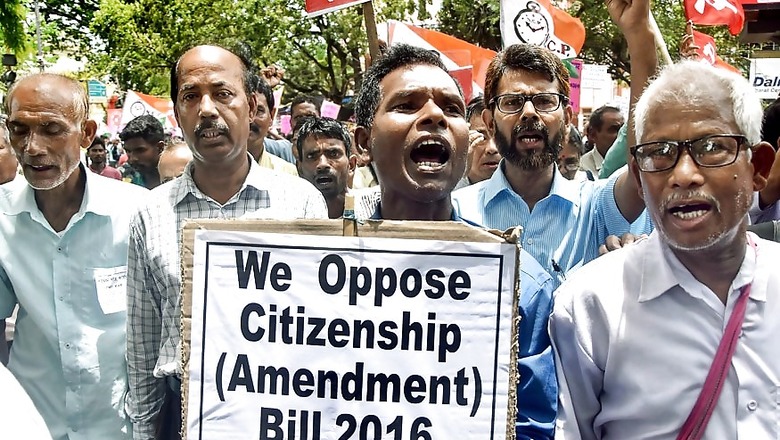
views
New Delhi: The Supreme Court on Monday said a plea challenging the Citizenship (Amendment) Bill, which seeks to provide Indian citizenship to non-Muslims from Bangladesh, Pakistan and Afghanistan, could only be taken up after the bill was approved by the Rajya Sabha.
A bench headed by Chief Justice Ranjan Gogoi said it would keep the plea filed by the "Nagarikatwa Aain Songsudhan Birodhi Mancha" (Forum Against Citizenship Act Amendment Bill) and others pending and might hear it only after Parliament took the final view on the bill.
"Having heard the counsel for the petitioners, we are of the view that this matter should remain pending and be taken up only after the Citizenship Amendment Bill, the consideration of which is now stated to be pending before the Rajya Sabha, reaches its finality.
"The petitioners will be at liberty to mention the matter at the appropriate time," the bench, also comprising justices Ashok Bhushan and S K Kaul, said.
The bill has been cleared by the Lok Sabha and it would now be presented in the Upper House of Parliament. The public interest litigation (PIL) has sought to declare the Passport (Entry into India) Amendment Rules, 2015 and the Foreigners (Amendment) Order as "discriminatory, arbitrary and illegal".
"We can keep this plea pending and if it (bill) is passed in the Rajya Sabha, then the lawyer can mention it for hearing," the bench said.
The bill, passed in the Lok Sabha on January 8, provides for according Indian citizenship to the Hindus, Jains, Christians, Sikhs, Buddhists and Parsis who fled religious persecution in Bangladesh, Pakistan and Afghanistan after six years of residence in India, instead of the 12 years currently, even if they do not possess any document.
It also seeks to provide relief to the persecuted migrants who have come through the western borders of the country to states like Gujarat, Rajasthan, Delhi and Madhya Pradesh, the home minister had said.
The PIL opposed the bill on the ground that it had introduced religion as a new principle into the citizenship law and termed it as "communally motivated humanitarianism".
"Never before has religion been specifically identified in the citizenship law as a ground for distinguishing between citizens and non-citizens. It has introduced religion as a new principle into the citizenship law and can be conveniently branded as 'communally motivated humanitarianism'.
"The illegal immigrants who are to be granted the benefit of this legislation are to qualify for citizenship only on the basis of religion, a requirement that goes against one of the basic tenets of the Indian Constitution, secularism," it said.
It further claimed that the "direct and inevitable" effect of the bill would be the dilution of the Assam Accord inked in 1985, which presently made anyone entering Assam from Bangladesh after March 24, 1971 an "illegal immigrant".
"The amendment defeats the purpose of the accord and opens the floodgates to more illegal immigration and consequently, increases claims on diminishing resources. The transformation of migrants, hitherto perceived as illegal encroachers, into legitimate citizens cannot be justified," it said.
The plea further claimed that the bill had the potential to "derail and nullify" the gains made by updating the National Register of Citizens (NRC) in Assam.
"Many persons, who could not otherwise establish their claims and were therefore excluded from the draft NRC published recently, can now take shelter under this and subsequently, become legitimate Indian citizens at the cost of the indigenous people of Assam," it said.
The petition further alleged that Assam had repeatedly witnessed ethnic clashes and violence, which were arising out of existential threat perceptions, fear of being reduced to minority in one's own homeland and giving up territories to foreigners and imposition of foreign or alien culture.
The PIL sought directions to the Centre, the Ministry of External Affairs and the Assam government to declare the Passport (Entry into India) Amendment Rules, 2015 and the Foreigners (Amendment) Order as "discriminatory, arbitrary and illegal".
It further sought directions to the Centre to constitute a National Immigration Commission or any other appropriate body to frame a National Immigration Policy and a National Refugee Policy.




















Comments
0 comment